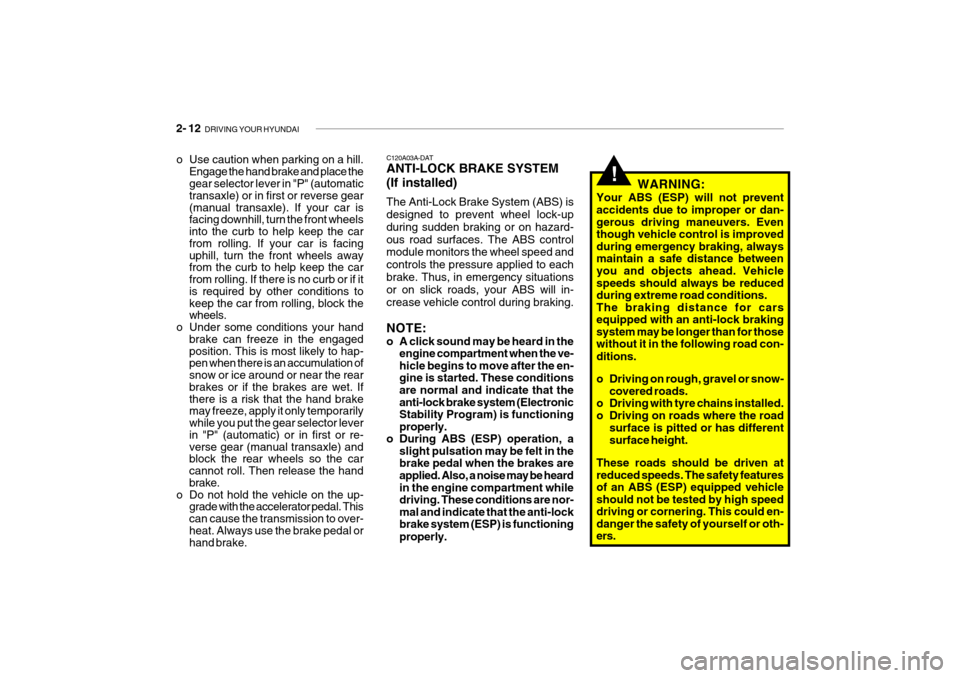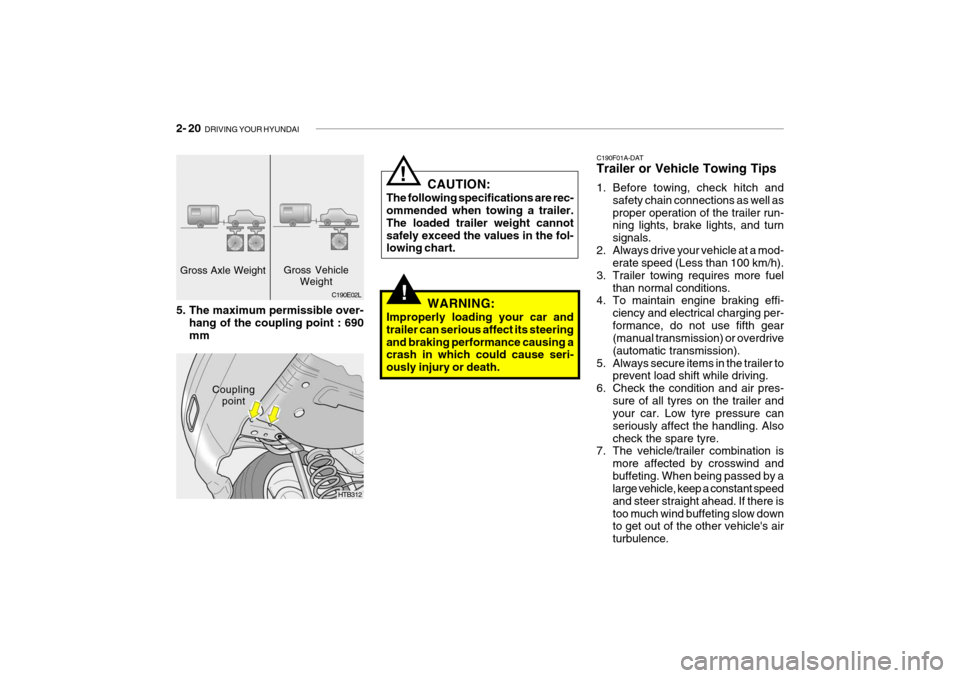Page 107 of 191

2- 12 DRIVING YOUR HYUNDAI
!WARNING:
Your ABS (ESP) will not prevent accidents due to improper or dan- gerous driving maneuvers. Eventhough vehicle control is improvedduring emergency braking, alwaysmaintain a safe distance betweenyou and objects ahead. Vehicle speeds should always be reduced during extreme road conditions.The braking distance for carsequipped with an anti-lock brakingsystem may be longer than for thosewithout it in the following road con- ditions.
o Driving on rough, gravel or snow- covered roads.
o Driving with tyre chains installed.
o Driving on roads where the road surface is pitted or has different surface height.
These roads should be driven at reduced speeds. The safety features of an ABS (ESP) equipped vehicleshould not be tested by high speeddriving or cornering. This could en-danger the safety of yourself or oth-ers.
C120A03A-DAT ANTI-LOCK BRAKE SYSTEM (If installed) The Anti-Lock Brake System (ABS) is designed to prevent wheel lock-up during sudden braking or on hazard-ous road surfaces. The ABS control module monitors the wheel speed and controls the pressure applied to eachbrake. Thus, in emergency situations or on slick roads, your ABS will in- crease vehicle control during braking. NOTE:
o A click sound may be heard in the
engine compartment when the ve- hicle begins to move after the en-gine is started. These conditionsare normal and indicate that the anti-lock brake system (Electronic Stability Program) is functioningproperly.
o During ABS (ESP) operation, a slight pulsation may be felt in thebrake pedal when the brakes are applied. Also, a noise may be heard in the engine compartment whiledriving. These conditions are nor-mal and indicate that the anti-lockbrake system (ESP) is functioning properly.
o Use caution when parking on a hill.
Engage the hand brake and place the gear selector lever in "P" (automatic transaxle) or in first or reverse gear (manual transaxle). If your car is facing downhill, turn the front wheels into the curb to help keep the car from rolling. If your car is facing uphill, turn the front wheels away from the curb to help keep the car from rolling. If there is no curb or if it is required by other conditions to keep the car from rolling, block the wheels.
o Under some conditions your hand brake can freeze in the engaged position. This is most likely to hap- pen when there is an accumulation of snow or ice around or near the rear brakes or if the brakes are wet. If there is a risk that the hand brake may freeze, apply it only temporarily while you put the gear selector lever in "P" (automatic) or in first or re- verse gear (manual transaxle) and block the rear wheels so the car cannot roll. Then release the hand brake.
o Do not hold the vehicle on the up- grade with the accelerator pedal. This can cause the transmission to over- heat. Always use the brake pedal or hand brake.
Page 115 of 191

2- 20 DRIVING YOUR HYUNDAI
!
C190F01A-DAT Trailer or Vehicle Towing Tips
1. Before towing, check hitch and
safety chain connections as well as proper operation of the trailer run- ning lights, brake lights, and turn signals.
2. Always drive your vehicle at a mod- erate speed (Less than 100 km/h).
3. Trailer towing requires more fuel than normal conditions.
4. To maintain engine braking effi-
ciency and electrical charging per-formance, do not use fifth gear (manual transmission) or overdrive (automatic transmission).
5. Always secure items in the trailer to prevent load shift while driving.
6. Check the condition and air pres- sure of all tyres on the trailer and your car. Low tyre pressure can seriously affect the handling. Alsocheck the spare tyre.
7. The vehicle/trailer combination is
more affected by crosswind andbuffeting. When being passed by a large vehicle, keep a constant speed and steer straight ahead. If there istoo much wind buffeting slow down to get out of the other vehicle's air turbulence.
!
Gross Axle Weight
Couplingpoint C190E02L
Gross Vehicle
Weight
HTB312
5. The maximum permissible over-
hang of the coupling point : 690 mm CAUTION:
The following specifications are rec- ommended when towing a trailer. The loaded trailer weight cannotsafely exceed the values in the fol- lowing chart.
WARNING:
Improperly loading your car and trailer can serious affect its steeringand braking performance causing a crash in which could cause seri- ously injury or death.
Page 116 of 191

DRIVING YOUR HYUNDAI 2- 21
14. When going down a hill, shift into a
lower gear and use the engine brak- ing effect. When ascending a longgrade, downshift the transmission to a lower gear and reduce speed to reduce chances of engine over-loading and/or overheating.
15.If you have to stop while going
uphill, do not hold the vehicle inplace by pressing on the accelera- tor. This can cause the automatic transmission to overheat. Use thehand brake or footbrake.
NOTE: When towing, check transaxle fluid more frequently. 1. Turn off the air conditioner.
2. Reduce highway speed.
3. Select a lower gear when going up-
hill.
4. While in stop and go traffic, place
the gear selection in park or neutraland idle the engine at a higher speed.
CAUTION:
If overheating should occur whentowing, (temperature gauge reads near red zone), taking the following action may reduce or eliminate theproblem.
!
8. When parking your car and trailer,
especially on a hill, be sure to follow all the normal precautions. Turnyour front wheel into the curb, set the hand brake firmly, and put the transmission in 1st or Reverse(manual) or Park (automatic). In addition, place wheel chocks at each of the trailer's tyres.
9. If the trailer has electric brakes, drive your vehicle with the trailerattached, and then apply the trailerbrakes by hand. This test confirms the operation of the trailer brakes and also checks your electrical con-nection at the same time.
10.During your trip, check occasion-
ally to be sure that the load issecure, and that the lights and any trailer brakes are still working.
11.Avoid jerky starts, sudden accel- eration or sudden stops.
12.Avoid sharp turns and rapid lane
changes.
13.Avoid holding the brake pedal down too long or too frequently. This could cause the brakes to overheat, re-sulting in reduced braking efficiency. D120A02A-DAT IF YOU LOSE YOUR KEYS If you happen to lose your leys, your vehicle will require towing to your Hyundai dealer to have the new set ofkeys programmed to your vehicle.